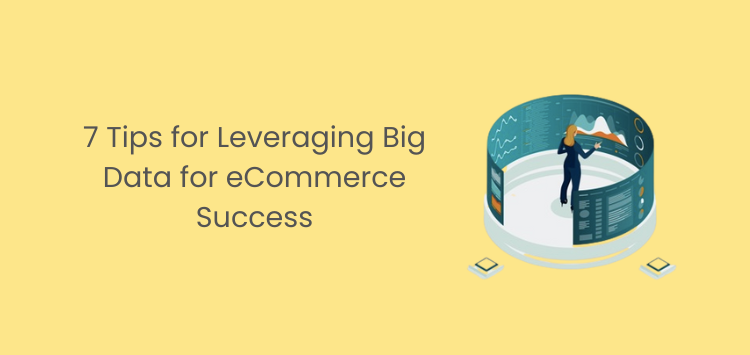The e-commerce industry is currently experiencing a huge shift due to the advancements in cloud computing, machine learning and artificial intelligence.
Today, e-commerce businesses, in particular, have a vast amount of data at their disposal that can provide valuable insights into customer behaviour, market trends, and business operations.
With this rise of generative AI tools that allow you to produce different types of text, video or image content in minutes, it’s become much easier to transform a business’s sales and earnings potential with big data.
Data can help any business unlock hidden patterns and trends that can guide them towards effective strategies.
In this article, we will explore five crucial lessons that e-commerce owners can learn from big data to improve their business strategies and achieve remarkable results. But first, let’s delve into the world of big data and discover how e-commerce owners can leverage it to their advantage.

What is Big Data?
In its most simplistic definition, we’d define big data as having a super-duper big box full of toys. Imagine you have so many toys that you can’t count them all. There are little cars, dolls, building blocks, and so much more. Big data is just like that, but instead of toys, it’s lots and lots of information.
Big data refers to the massive volumes of structured and unstructured data that businesses collect from multiple sources. It encompasses a wide range of data types, including customer transactions, website interactions, social media posts, and more.
In the realm of e-commerce, big data holds immense value. It allows businesses to analyze customer behaviour, preferences, and purchase patterns on a granular level. By understanding these insights, e-commerce owners can tailor their offerings, improve customer experiences, and optimize their marketing efforts. Big data also facilitates better inventory management, fraud detection, and pricing strategies, leading to increased efficiency and profitability.
Implementing a Big Data Strategy For Your Ecommerce Business
To successfully implement a big data strategy, e-commerce owners should consider the following steps:
Define Your Objectives
Identify specific business objectives and align them with the data-driven insights you want to achieve. Whether it’s improving customer satisfaction, increasing sales, or optimizing operational efficiency, clearly defining your objectives will guide your big data initiatives.
Ask yourself what you want to achieve with the data that you’ll get. Create a problem statement that guides and informs your answers carefully.
Selecting the Right Tools
Evaluate different tools and technologies available for big data analytics and choose the ones that best suit your business requirements. From data storage and processing platforms to analytics tools and visualization software, select solutions that align with your objectives and budget.
Hire A Skilled Data Team
Assemble a skilled data team comprising data scientists, analysts, and engineers. These professionals will be responsible for collecting, analyzing, and interpreting data, as well as implementing data-driven strategies.
Hiring individuals with expertise in machine learning and statistical analysis can further enhance your big data capabilities. If you’re on a tight budget, you can outsource the project to a freelancer or agency that provides operational support for data analysis.
Establish Data Hierarchy
Develop data governance policies and procedures to ensure data quality, security, and compliance. Establish data governance frameworks that outline data ownership, access controls, and data usage guidelines. This basically means who has control of what, where and how. Regularly review and update these policies to align with evolving business needs and regulatory requirements.
7 Tips For Leveraging Big Data for eCommerce Success

Create Personalized Customer Experiences
One of the most significant advantages of big data for e-commerce owners is the ability to provide personalized customer experiences. Big data provides a treasure trove of information about your customer’s behaviour, preferences, and purchasing patterns.
As an e-commerce store owner or operator, personalization should be a key aspect of your business or marketing strategy. Research shows that 77% of consumers have chosen, recommended, or paid more for a brand that provides a personalized service or experience.
Also, Salesforce revealed that customers are now expecting offers to be tailored 52% of the time, up from 49% in 2019. This goes to show just how important personalization is for your business in today’s world.
Businesses can gain insights into individual preferences, purchase history, and browsing behaviour in order to improve their processes or make the customer’s journey more pleasant and enriching with personalization.
This information enables e-commerce platforms to deliver tailored recommendations, personalized promotions, and targeted marketing campaigns. Which in turn leads to customer satisfaction, engagement, customer loyalty and increased sales.
For instance, Amazon, the e-commerce giant, leverages big data to provide personalized product recommendations to its customers.
Optimize Demand Forecasting and Inventory Management
Demand forecasting is a growing trend that allows companies to optimize their inventory and save costs. It is a crucial need for e-commerce businesses in order for them to maximise their limited funds and gain the most value.
Big data analytics can provide valuable insights into historical sales data, seasonal trends, and customer preferences, enabling e-commerce owners to forecast demand with greater accuracy.
For example, let’s say a Shopify store sells clothes. Big data can analyze information like which types of clothes are selling the most, which colours or sizes are popular, and even consider factors like the weather or upcoming events.
By aligning their inventory levels with anticipated demand, businesses can prevent stockouts, reduce excess inventory, and improve overall operational efficiency.
Improve Marketing Efficiency
Marketing in the digital age requires a deep understanding of customer preferences and behaviour. Big data empowers e-commerce owners to create targeted marketing campaigns by leveraging customer insights.
Marketing efforts may now be observed and analyzed because of the wealth of information made available by big data. It records information on our potential clients and clients at a level of detail never before imaginable. In this way, we may influence audience behaviour in the present and provide real-time responses to audience activities.
Since 70% of the world’s data is user-generated, it poses a great opportunity for understanding what consumers are interested in at different points in their lives and applying strategies that meet their needs.
Businesses can tailor their marketing messages to specific customer groups using segmentation characteristics based on demographics, purchase history, and online behaviour. This targeted approach improves the effectiveness of marketing campaigns, increases customer engagement, and drives higher conversion rates.
Enhancing Fraud Detection
Online fraud poses a significant challenge for e-commerce businesses. Big data analytics can be employed to identify patterns and anomalies that may indicate fraudulent activities.
Machine learning algorithms can enhance fraud detection capabilities. By training models on historical data, these algorithms can learn patterns of fraudulent behaviour and apply them to real-time data to identify potential fraud.

For instance, let’s imagine you own an online retail store that sells electronic gadgets, through data analytics, you have established patterns of legitimate transactions based on factors like purchase amount, shipping address, and customer behaviour. One day, your system detects a transaction with an unusually high purchase amount compared to previous orders. This triggers an alert for further investigation.
Also, if you’ve implemented a real-time monitoring system that continuously analyzes incoming transactional data. When a transaction meets specific criteria indicating potential fraud, an immediate alert is generated. This allows you to take swift action, such as contacting the customer for verification or suspending the transaction until further investigation.
With big data analysis, e-commerce platforms can detect suspicious behaviour, such as unusual purchase patterns or irregular login activities. Businesses can minimize financial losses and protect their customers’ data.
Optimizing Pricing Strategies
Pricing plays a critical role in the success of e-commerce businesses. It directly impacts customer behaviour, revenue generation, and overall profitability. Big data analytics can provide valuable insights into market trends, competitor pricing, and customer behaviour, enabling businesses to optimize their pricing strategies.
You can create additional value for your customers using insights derived from big data. Different customer segments may have distinct preferences, purchasing power, and sensitivity to price. Segmenting your customer base allows you to tailor pricing strategies to each group.
For example, offering discounts or loyalty programs to price-sensitive customers, while providing premium options for those willing to pay more for added value.
Also, experimenting with different pricing strategies on a small scale and measuring the impact on customer behaviour can greatly improve your business strategy and success measures.
Utilize psychological pricing techniques to influence customer perception and compare pricing variations, such as different price points, discounts, or bundling options, to identify the most effective approach.

Improving Customer Service
The use of big data can help identify issues with product delivery, customer satisfaction, and even the public’s opinion of a company on social media. In reality, big data analytics can pin down the times and places where consumers’ opinions and satisfaction won.
For Instance, Netflix uses big data analytics to drive its content recommendation engine. The streaming platform uses big data analysis to understand your viewing habits, preferences, and interactions with the platform. Based on this data, the recommendation engine suggests movies and TV shows that align with your interests. The more you engage with the platform, the better it becomes at offering relevant content, resulting in a highly personalized viewing experience.
eCommerce businesses can more easily implement long-term changes to customer service if they have clear targets for those changes.
Optimizing SEO
Big data analysis allows businesses to identify popular search terms and phrases that users enter into search engines when looking for specific products, services, or information about their business. They can determine which keywords are most relevant and have the highest potential for driving organic traffic to their website by simply analysing large sets of data.
This data can also help to identify trends, patterns, and correlations between specific ranking factors and search engine performance. This knowledge helps in devising effective strategies to improve website rankings and visibility in search engine results pages (SERPs).
Conclusion
Big data has revolutionized the way e-commerce businesses operate and make strategic decisions. By harnessing the power of big data analytics, e-commerce owners can gain valuable insights into customer behaviour, enhance personalized experiences, optimize operations, and drive business growth.









